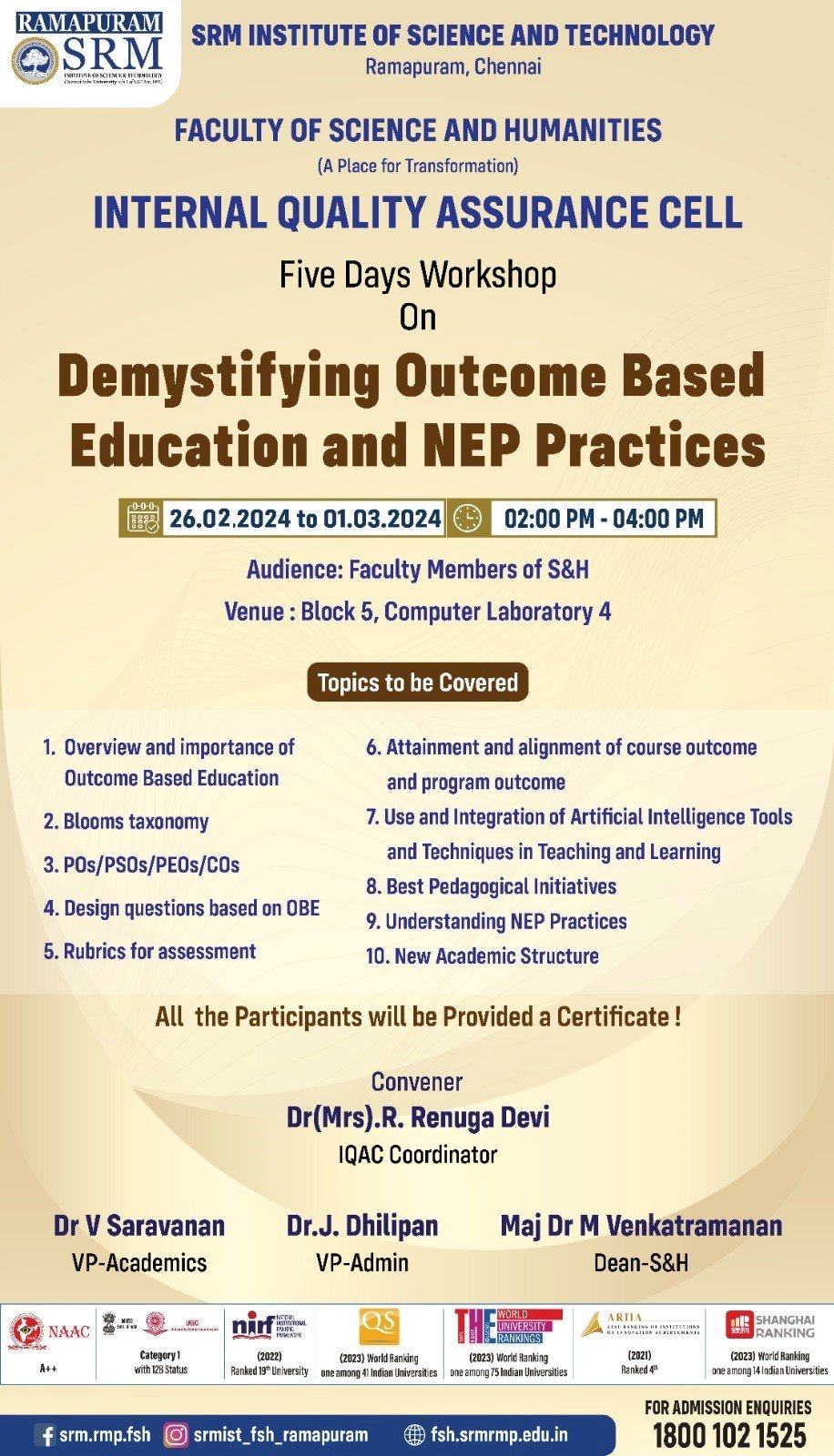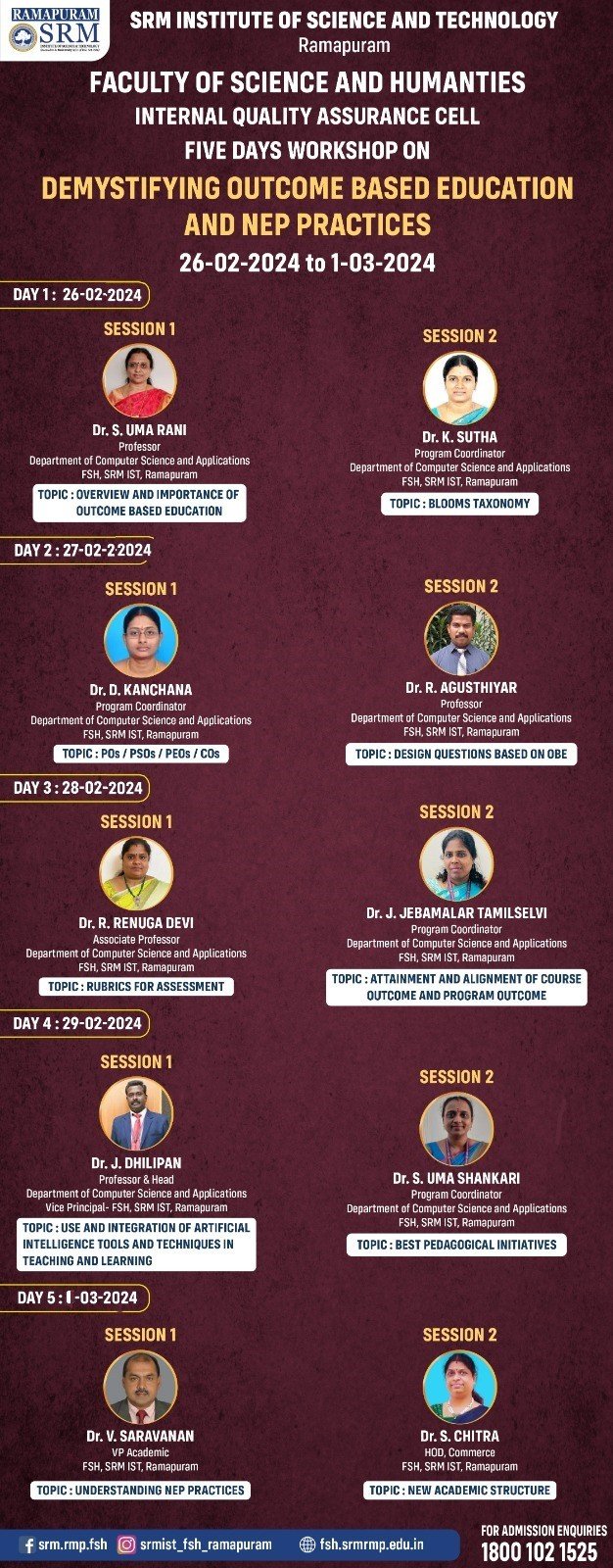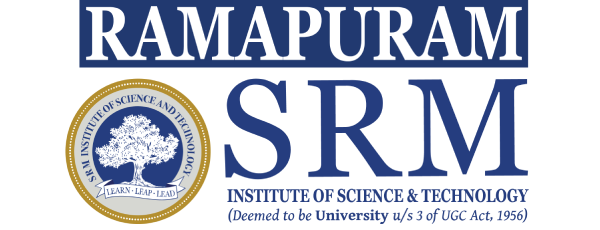FACULTY OF SCIENCE AND HUMANITIES
(A Place for Transformation)
Internal Quality Assurance Cell
FIVE DAYS WORKSHOP ON
DEMYSTIFYING OUTCOME BASED EDUCATION AND NEP PRACTICES
Date: 26.02.2024 to 1-03-024 Venue: Block V 4th Floor Lab
Time: 2.00 PM to 4.00 PM
Beneficiaries: Faculty Members of FSH


Day 1: 26-02-2023- Monday- Report
- R. Renuga Devi, IQAC Coordinator, FSH presented the welcome address.
- V. Saravanan, VP Academic, FSH given Felicitation address. He emphasized the significance of OBE and NEP in shaping the future of education in our Institution.
- Dr. M. Venkatramanan given Presidential Address and provided insights into the key principles and objectives of OBE and NEP, emphasizing the need for collaborative efforts to translate these principles into effective practices.
Session 1: Overview and Importance of Outcome Based Education
👉Speaker: Dr. S. Uma Rani, Professor, Department of CSA, FSH, RM IST.
Points Discussed
🔹 Dr. S. Uma Rani started her presentation with the importance of following OBE practices in Institutions.
🔹 Universities in India following OBE practices.
🔹 Stated the importance of ABC ID.
🔹 Emphasized the importance of Continuous Learning.
🔹 Addressed the difference between Good Education and Great Education
🔹 Provided insights into OBE with examples.
🔹 Addressed how to achieve quality in Higher Education Institutions.
🔹 Discussed the difference between Traditional System and OBE system.
🔹 Given information about POs, PSOs.
Session 2: Blooms Taxonomy
👉Speaker: Dr. K. Sutha Assistant Professor, Department of CSA, FSH, SRM IST
Points Discussed
🔹Dr. K. Sutha clearly explained the different levels of Blooms Taxonomy.
🔹Stated the History of Blooms taxonomy development
🔹 Brief Description of Cognitive Domains given by the speaker with some real time examples.
- Remembering: Ability to recall facts and basic concepts.
- Understanding: Ability to comprehend and interpret information.
- Applying: Ability to use knowledge and concepts in new situations.
- Analyzing: Ability to break down information into parts and understand relationships.
- Evaluating: Ability to judge the value of information or ideas based on criteria.
- Creating: Ability to generate new ideas or solutions
🔹Clearly explained the way of using different levels of blooms taxonomy while setting question paper
🔹 Explained fee sample questions for better understanding of blooms taxonomy
🔹 The session was opened for discussion. Both the sessions are useful for the faculty members
Day 2: 27-02-2024 – Tuesday- Report
Session 1: POs / PSOs / PEOs / COs
Speaker: Dr. D. Kanchana, Program Coordinator, Department of CSA(MCA), FSH, SRM IST.
Points Discussed:
- D. Kanchana, emphasized the importance of aligning COs with POs to ensure that course content and assessments support program goals.
- Highlighted the role of PLOs in guiding curriculum development and assessment practices to meet the needs of stakeholders.
- Significance of alignment between POs and COs, PLOs and CLOs
- Role of faculty in mapping COs to POs and CLOs to PLOs
- Implications for curriculum design, assessment strategies, and student learning outcomes
- Resources and support available for faculty to enhance their understanding and implementation of POs, COs, PLOs, and CLOs.
Session 2: Design Questions Based on OBE
Speaker: Dr. R. Agusthiyar, Professor, Department of CSA, FSH, SRM IST.
Points Discussed:
- R. Agusthiyar provided guidance on aligning question paper design with Outcome-Based Education (OBE) principles and Bloom’s Taxonomy. Key points covered include:
- Introduction to OBE question design.
- Understanding Bloom’s Taxonomy levels.
- Aligning questions with Bloom’s levels.
- Mapping learning objectives to Bloom’s Taxonomy.
- Strategies for designing questions at different levels.
- Balancing difficulty levels across Bloom’s levels.
- Practical application through exercises.
- Importance of quality assurance in question design.
- Participants gained insights and skills to create effective question papers that assess student learning outcomes comprehensively within an OBE framework.
Day 3: 28-02-2024 – Wednesday- Report
Session 1: Rubrics for Assessment
Speaker: Dr. R. Renuga Devi, Associate Professor, Department of CSA, FSH, SRM IST.
Points Discussed:
Dr. R. Renuga Devi started her session by giving definition of Rubrics and Tools used to assess and evaluate student performance based on predetermined criteria and standards.
Discussed the Components of Rubrics:
Criteria: Specific aspects of performance being evaluated.
Levels of Performance: Descriptions of performance at each level (e.g., Excellent, Good, Fair, Poor).
Scoring or Rating Scale: Numerical or descriptive scale used to assign scores or ratings.
Clearly explained the Importance Rubrics in Assessment:
Provides clarity and transparency in assessment expectations.
Supports consistent and fair evaluation of student work.
Offers valuable feedback to students for improvement.
Given explanation on how to design effective rubrics
Explained with assignment assessment and Oral Presentation assessment examples.
- Participants engaged in discussion and shared experiences with rubric use.
- Speaker addressed questions and provided examples to illustrate key points.
Session 2 : Attainment and Alignment of Course Outcome and Program Outcome.
Speaker: Dr. J. Jebamalar Tamilselvi, Program Coordinator, Department of CSA (B.Sc CS), FSH, SRM IST.
Points Discussed:
- Jebamalr stated her session by explaining the Importance of aligning Course Learning Outcomes (CLOs) with Program Learning Outcomes (PLOs) to ensure coherence and effectiveness in curriculum design.
- Explained the Role of faculty in mapping CLOs to PLOs and ensuring alignment between course objectives, content, and instructional methods.
- Implications of course attainment and alignment for enhancing student learning experiences.
- The speaker provided a detailed explanation of the components involved in the CAR process.
- Conducted a live demonstration of the CAR creation process, using a sample curriculum as a reference.
- Demonstrated how to review course objectives, content, assessments, and alignment with program goals.
- The final stage of the demo focused on revision planning, where the speaker outlined strategies for prioritizing curriculum changes, setting goals, and developing an action plan.
The session concluded with a Q&A session, allowing participants to ask questions and seek clarification on any aspects of the CAR creation process.
Day 4: 29-02-2024 – Thursday- Report
Session 1: Use and Integration of Artificial Intelligence Tools in Teaching Learning
Speaker: Dr. J. Dhilipan, Professor & Head, Department of CSA, FSH, SRM IST.
Points Discussed:
- J. Dhilipan given introduction about the use of Artificial Intelligence (AI) tools in teaching-learning processes.
- Explanation given about the AICTE Anuvadini tool and its functionalities.
- Demonstration of how AI tools can enhance student engagement and learning outcomes.
- Discussion on the integration of AI tools into various subjects and disciplines.
- Exploration of the benefits and challenges associated with using AI in education.
- Strategies for effectively incorporating AI tools into teaching methodologies.
- Considerations for ensuring equity and accessibility when using AI tools in diverse learning environments.
- Future trends and developments in AI-enabled education and their potential impact on teaching and learning practices.
- Recommendations for educators and institutions looking to adopt AI tools in their educational practices.
Session 2: Best Pedagogical Initiatives
Speaker: Dr. S. Uma Shankari, Program Coordinator, Department of CSA (BCA), FSH, SRM IST
Points Discussed:
- Introduction to innovative pedagogical approaches.
- Importance of student-centered and active learning.
- Case studies demonstrating successful pedagogical practices.
- Participants brainstorm ideas for implementing pedagogical initiatives in their own teaching practice or institution, fostering creativity and collaboration.
- Inclusive strategies for diverse student needs.
- The speaker presents case studies of successful pedagogical initiatives, and participants analyze and discuss the strategies used and their impact on student learning.
- Demonstration given on Activity based learning.
- Opportunities for collaboration and networking.
- Reflection on future trends in pedagogy.
Conclusion with a Q&A session for participant clarification.
Day 5: 01-03-2024 – Friday- Report
Session 1: Understanding NEP Practices
Speaker: Dr. V. Saravanan, Vice Principal- Academic FSH, SRM IST.
Points Discussed:
- V. Saravanan provided an overview of the National Education Policy (NEP), highlighting its significance in transforming the Indian education system.
- The session focused on practical strategies for effectively implementing NEP practices in educational institutions, considering diverse contexts and stakeholders.
- Participants gained insights into the specific guidelines and frameworks outlined in the NEP, such as curriculum reforms, teacher training, and assessment practices.
- Attendees learned about the importance of ongoing monitoring and evaluation to assess the effectiveness of NEP implementation and make necessary adjustments.
- V. Saravanan emphasized the NEP’s focus on inclusive education, highlighting the need to address diversity, equity, and accessibility to ensure the participation and success of all learners.
- The session concluded with a discussion on future directions for scaling up NEP practices and fostering innovation in education to meet the evolving needs of learners and society.
Session 2: New Academic Structure
Speaker: Dr. S. Chitra, Professor & Head, Department of Commerce, FSH, SRM IST.
Points Discussed:
- S. Chitra discussed the rationale for adaptation to changing educational trends and workforce needs.
- Explained the interdisciplinary, skill-focused, and practical nature of the curriculum.
- Discussed about modular courses, online options, and experiential learning as components of flexible learning.
- Explained the evaluation based on mastery of skills in competency-based assessment.
- Information about the utilization of AI, VR, and data analytics in technology integration.
- The comprehensive support provided for student success in student support services.
- Discussed the training provided for effective implementation in faculty development.
- The phased rollout with monitoring mechanisms in the implementation plan.
Presentation on the new academic structure provided valuable insights and direction for navigating the changing landscape of higher education, fostering excellence, and ensuring the relevance and competitiveness of educational institutions
Dr. R. Renuga Devi, Proposed Vote of thanks and Certificate provided to all the Participants at the valedictory function.
Convener
Dr. R. Renuga Devi, IQAC Coordinator, FSH
Advisors
Dr. V. Saravanan, VP Academics, FSH
Dr. J. Dhilipan, VP Admin, FSH
Maj. Dr. M. Venkatramanan, Dean FSH
